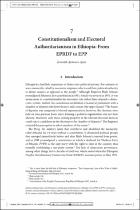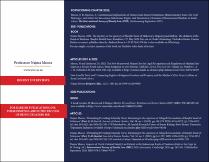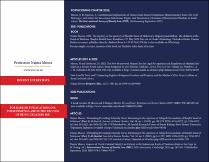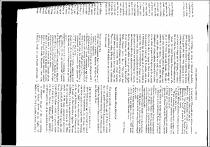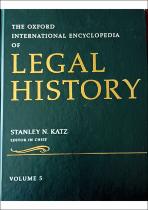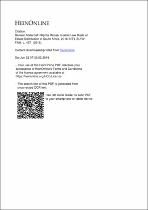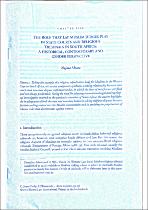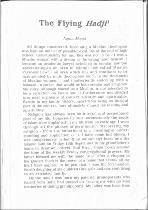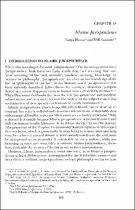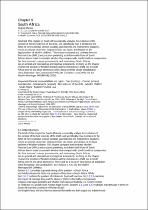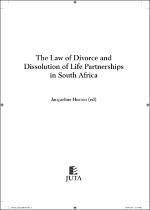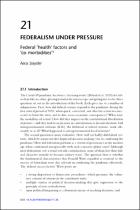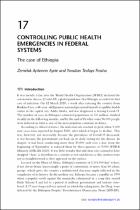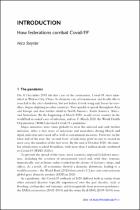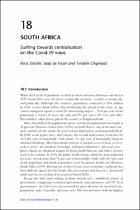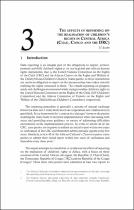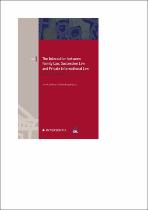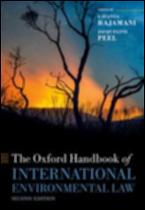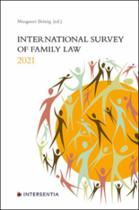Book and Book Chapters (Faculty of Law)
Browse by
Recent Submissions
-
Constitutionalism and electoral authoritarianism in Ethiopia: From EPRDF to EPP
(Oxford University, 2020)Ethiopia has had little experience of democratic political systems. For centuries it was a monarchy, ruled by successive emperors who traced their political authority to divine sources as opposed to the people.1 Although ... -
Aspects of Dutch colonial family law related to the Indonesian rajah of Tambora’s exile at the cape
(Intersentia, 2020)The Muslims who arrived at the Cape during the first period of Dutch colonisation in the seventeenth century hailed from different geographical locations, were of different cultural and ethnic backgrounds and, more ... -
South Africa: Homosexual Muslims in South Africa: Some legal implications, including constitutional, marriage and succession’
(Intersentia, 2022)This chapter focuses on the succession rights and testamentary freedom of male (gay) and female (lesbian) homosexuals in Islam and in South Africa. It highlights that, although the practice of male homosexuality and same-sex ... -
Women, gender and child marriage: Sub-Saharan Africa, overview
(Encyclopedia of Women and Islamic Cultures, 2006)This entry provides an overview of early marriage of girls under the age of 18 from a human rights and gender perspective. It examines international conventions relating to child marriage and critiques the application of ... -
Chapter 6: Culture and religion
(Juta, 2007)This chapter deals with the relationship between gender equality and rights to practice culture and religion. In South Africa this relationship is of crucial importance to women who live according to the rules and principles ... -
South Africa: Indian Law
(Oxford University Press, 2009)The South African legal system comprises common law (Roman-Dutch and English law developed through case law) legislation and (mainly African) customary law with elements of Muslim, Hindu, Jewish and Zoroastrian (Parsi) ... -
Islamic mode of estate distribution in South Africa
(Jordan Publishing LexisNexis, 2016)It has been argued by some academics that the Islamic law of intestate succession discriminates against females due to its unequal distribution of shares in favour of males.' The general example used in this regard is when ... -
The role that lay Muslim judges play in state courts and religious tribunals in South Africa: A historical, contemporary and gender perspective
(Kluwer, 2002)Taking the example of a religious adjudicative body for Muslims in the Western Cape in South Africa, this article analyses the symbiotic working relationship between state courts and non-state dispute settlement bodies, ... -
The Flying Hadji
(Stellenbosch: Institute for Theological Interdisciplinary Research (EFSA) in cooperation with CCAWT Research, 2000)All things considered, becoming a Muslim theologian was high on my list of possible vocations at the end of high school. Unfortunately for me, this was not to be I was a Muslim woman with a dream at the wrong time. Instead, ... -
Chapter 18 Islamic Jurisprudence
(Juta, 2004)What is the meaning of the word Jurisprudence? The etymology of the word 'jurisprudence' hails from two Latin words; first, 'ius' meaning 'law' and 'iuris' meaning 'of law' and secondly, 'prudens' meaning 'knowledge' or ... -
Parental Care and the Best Interest of the Child in Muslim Countries
(T.M.C. Asser Press The Hague, 2017)This chapter on South Africa critically analyses the evolution of the concept of the best interests of the child, and specifically how it pertains to the fields of care (custody), contact (access), guardianship and ... -
Dissolution of a muslim marriage by divorce
(Juta, 2014)Although Muslims first arrived in South Africa more than 350 years ago and two decades have passed since the advent of democracy, their religious marriages are currently not formally recognized in terms of the (common) ... -
Federalism under pressure: Federal ‘health’ factors and ‘co-morbidities’
(Routledge, 2021)The Covid-19 pandemic has been a ‘focusing event’ (Béland et al. 2020) for federalism like no other, placing it under the microscope and giving rise to the three questions set out in the introduction of this book. Each ... -
Controlling public health emergencies in federal systems
(Routledge, 2021)It was merely a day after the World Health Organization (WHO) declared the coronavirus disease (Covid-19) a global pandemic that Ethiopia recorded its first case of infection. On 12 March 2020, a week after entering the ... -
Introduction: How federations combat Covid-19
(Routledge, 2021)On 31 December 2019, the first cases of the coronavirus, Covid-19, were identified in Wuhan City, China. Its dramatic rate of transmission and deadly effects soon led to the city’s shutdown, but not before it took wing ... -
South Africa: Surfing towards centralisation on the Covid-19 wave
(Routledge, 2021)When the Covid-19 pandemic reached its shores between February and March 2020, South Africa was already in a vulnerable situation – socially, economically, and politically. Although the country’s population, estimated ... -
The effects of reporting on the realisation of children’s rights in Central Africa
(Pretoria University Law Press, 2020)State reporting is an integral part of the obligations to respect, protect, promote and fulfil children’s rights as set out in global and African human rights instruments, that is, the United Nations Convention on the ... -
The interaction between family law, succession law and private international law: An introduction
(Intersentia, 2021)At the national level, the rules of substantive family and succession law work with private international law rules created specifically for these substantive laws. Hence, there cannot be any question that there is an ... -
Equity
(Oxford University Press, 2021)This chapter critically analyses the notion of equity in international environmental law. It begins by discussing the meaning of equity in international law and briefly reflecting on familiar examples of the manifestation ... -
The African children’s charter at 30: What implications for child and family law?
(Intersentia, 2021)This chapter examines the progress made and the difficulties encountered in the implementation of the African Charter on the Rights and Welfare of the Child (hereinafter the Charter) in the areas of children's rights and ...

